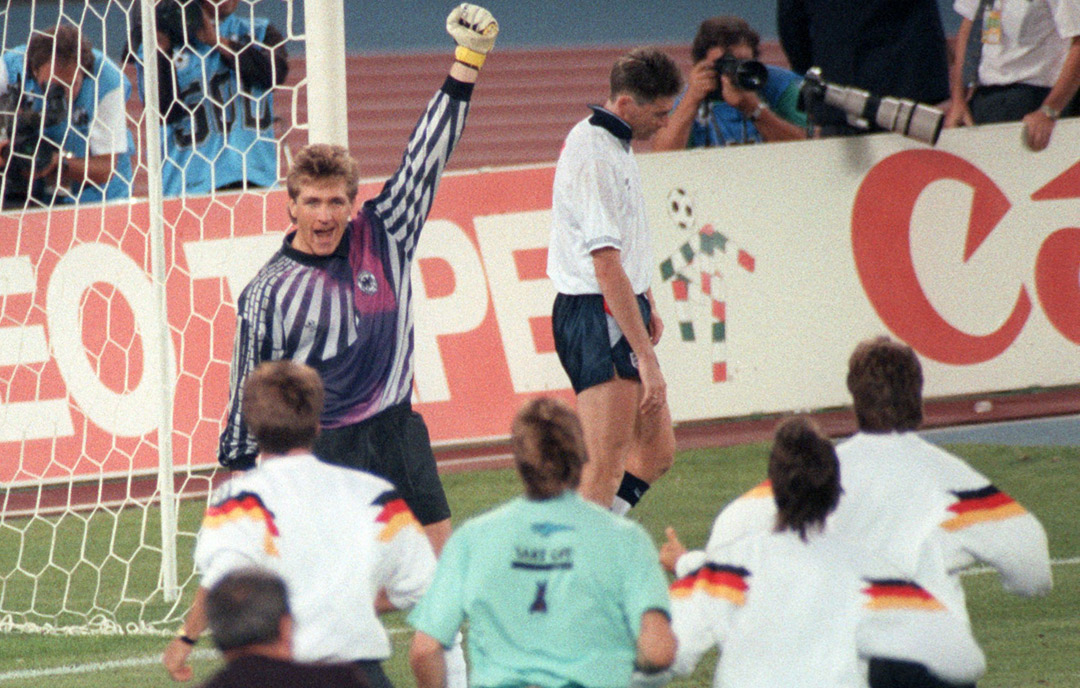Why World Cup 1990 was the tournament of the great goalkeeper
Illgner, Goycochea, Conejo, Shilton: the home of defensive football became the perfect stage for the globe's top shot-stoppers

The general consensus is that World Cup 1990 was a stinker. Beyond memorable moments from Milla, Gazza and Schillaci, the tournament was plagued by dishwater-dull, defensive games and a chronic lack of goals: Argentina made it to the final after scoring only five times, and five knockout matches – including both semis – were settled on penalties.
But if the strikers were thwarted and neutrals trudged home with numbed minds, one group of men could consider the Italian summer a triumph: goalkeepers. The globe's custodians boarded their return planes with a record-breaking 31 clean sheets, and only nine games out of 52 saw a team concede three or more times. Strong defences must take huge credit – Italy's ruthless backline boasted Maldini, Baresi, Ferri and Bergomi – but this was also a golden time for goalkeeping: across the competition, proud behemoths stood between the sticks.
Men like Spain's Andoni Zubizarreta, who would play over 700 professional games, 126 for his country and four consecutive World Cups. Hans van Breukelen, who minded Holland's nets for over a decade. Brazil's Taffarel, who found himself eliminated from Italia 90 despite letting in just two goals. Packie Bonner, who patrolled the Irish goalmouth for 15 years. And USSR's Rinat Dasayev, nicknamed 'the Iron Curtain' and rated by many as the best keeper of the 1980s.
Five other men, however, have got genuine claims as the summer's premier glovesman. Germany won the tournament in no small part down to Bodo Illgner, who was in exceptional form throughout. He marshalled his back-line with authority and was near unbeatable in one-on-one. His semi-final penalty save against Stuart Pearce saw Germany through, where Illgner would become the first man to keep a clean sheet in a World Cup final.

The other finalists, Argentina, also owed much to their No.1, Sergio Goycochea. After keeping a clean sheet in the defeat of Brazil, he was the star of two crucial shootouts: against Yugoslavia in the quarter-finals, and again in the semis against Italy, where he blocked efforts from Roberto Donadoni and Aldo Serena. El Goyco also got close to saving Brehme's penalty in the final. He was selected for the All-Star Team by FIFA jointly as the best keeper of the tournament.
The man who shared this honour was Costa Rica's Luis Gabelo Conejo. Although he played just three group games and let in two strikes, Conejo made a string of brilliant, athletic saves against Scotland, Sweden and Brazil. Unfortunately, he was injured for the second round game against Czechoslovakia, who scored four past his depleted side.
Peter Shilton surely also had a claim: the Englishman who clocked up 1005 career games and 125 international caps over a 33-year career was at his commanding best in 1990, where he managed three shutouts, helping set a still-unbeaten record of 10 World Cup clean sheets.
Get FourFourTwo Newsletter
The best features, fun and footballing quizzes, straight to your inbox every week.
Italy's Walter Zenga, however, can probably consider himself the unluckiest stopper in the tournament – and perhaps the history of the World Cup. The Italian legend broke the record for the length of time between letting in World Cup goals, not conceding once in the group stages, second round, or quarters. Unfortunately, when he finally did, it was a clanger.
After 517 minutes of goallessness spanning two tournaments, Zenga failed to grab a high ball against Argentina, allowing Caniggia to nod home. Italy drew 1-1, lost the shootout and Zenga was crucified by the press for his mistake. Even during a record-breaking summer, the world's No.1s were getting it in the neck, begging the age-old question: who'd be a goalkeeper?
Nick Moore is a freelance journalist based on the Isle of Skye, Scotland. He wrote his first FourFourTwo feature in 2001 about Gerard Houllier's cup-treble-winning Liverpool side, and has continued to ink his witty words for the mag ever since. Nick has produced FFT's 'Ask A Silly Question' interview for 16 years, once getting Peter Crouch to confess that he dreams about being a dwarf.

